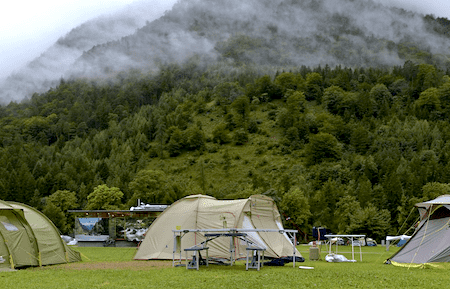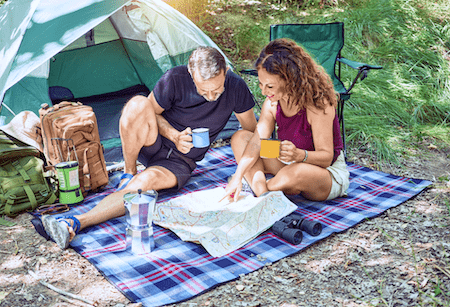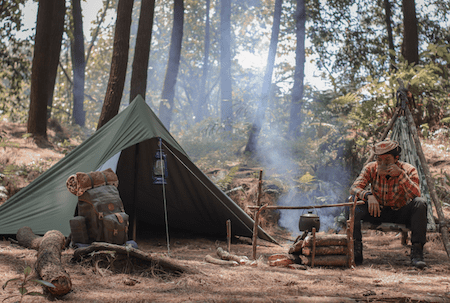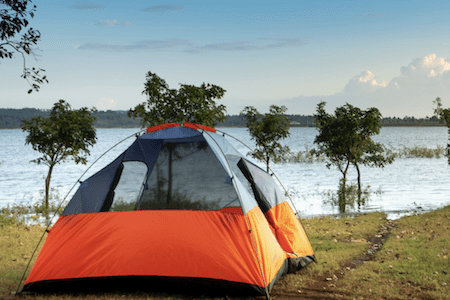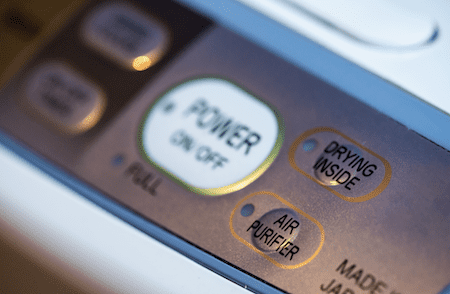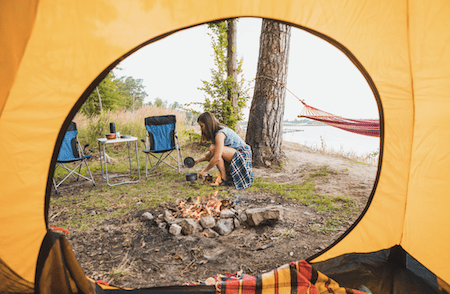You’re not alone if your beautiful sleep has ever been rudely interrupted by droplets of water formed by condensation in your tent.
Even the most experienced campers can relate to waking up to moisture infesting their tent without any leakage.
That’s what condensation feels like. It just pops up one day in parts of your tent without warning.
But if you’re interested in learning how to prevent condensation in a tent or get rid of it, read on.
I’ll show you the best ways to prevent and combat this problem. I’ll also explore some of the culprits responsible for it.
Let’s dig in.
Here’s Why Condensation Stole Your Tent
Contrary to what you might think, condensation doesn’t just appear out of thin air. If your tent is suddenly plagued by it, the chances are that you must have invoked its presence.
Check out some of the potential causes of condensation below.
#1. Weather
The first culprit of condensation is the weather. Two main weather conditions are likely to conjure condensation in your tent.
They are rain and snow; here’s how it works.
First, condensation occurs due to a clash of contrasting temperatures inside and outside the tent.
This contrast would likely happen when there’s a drop in temperature and an increase in humidity.
When it rains, condensation might happen if the temperature drops to a marked difference between the temperature inside and outside the tent.
That is the cold outside clashes with the increased humidity inside the tent.
The reaction of this collision is the liquid that settles on the tent’s surface. It also happens when it snows.
Although the snow won’t increase the humidity inside the tent, the drop in temperature outside is enough to evoke condensation.
#2. Campsite Location
The location you choose for camping could potentially condense the air. So, before you choose a campsite, you should look out for certain features.
For starters, if you choose a campsite with swimming holes, rivers, lakeside, etc., try not to pitch your tent too close to the river.
Newsflash: camping next to the river on a hot day can drown your tent in condensation.
So, while pitching your tent next to the water is good, you might want to check with the weather to ensure no severe contrast between the temperature inside and outside the tent.
Another thing that could cause condensation is camping on wet grounds. Pitch your tent on the dry ground instead.
Also, select an area that’s open to the breeze. That way, the air would kick out water vapors before they thought to condense.
#3. Human Breath And Pets
When we sleep, we release about 1 pint of water vapor. If there are multiple people in the tent, their breath adds to the moisture.
All the released vapor combines to increase the humidity in the tent. If there’s not enough air to flush out the vapor, it would eventually condense and sit on your tent.
This scenario is similar for pets, especially dogs. Because they mostly pant, their panting releases heat into the atmosphere.
This hikes the humidity in the air, potentially leading to condensation.
#4. Wet Personal Items
Personal items can also potentially condense the air, especially if they’re wet.
For instance, if water spills on a top you are wearing and spreads it inside the tent, you’ll increase moisture in the air.
That moisture could go on to trigger condensation.
So, your damp or wet clothes, shoes, and other personal items are also potential culprits.
#5. Cooking In The Tent
Cooking in the tent is another way to induce condensation. When you cook, a lot of vapors are expelled.
Now, if those vapors stay trapped in the tent, they will make themselves comfortable.
Eventually, they’d convert into moisture and latch unto parts of your tent.
#6. Camping Items
Now, your camping items like your sleeping bags or pads, backpack, etc., are devoid of moisture.
So, you won’t suspect them of being a culprit.
But the story changes when you explore the campsite with your backpack.
If you always let down the tent during the day and set it up at night, there’s the possibility that they’d have accumulated moisture from your adventure on the campsite, especially if they’re all stuffed in your backpack.
So, when you return to the area where you pitched your tent, if you feel any of your camping items are damp after the day’s activity, you should spread them outside to lose the dampness.
Otherwise, it could potentially condense the air and perch on your tent.
The wetness on your camping items will be evident if you get caught in the rain. You’d have to let your items thoroughly dry before bringing them into the tent.
#7. Heaters
Using heaters in your tent is a great idea, especially when camping in the winter.
However, if you do not use it well, it would create room for condensation to occur.
The reason is that heaters (mostly gas heaters) give off moisture when they are in use.
With too much vapor in the air, condensation is imminent.
However, in my experience candle tent heaters cause less condensation.
How To Prevent Condensation In Tent
Now that you know the possible culprits responsible for messing up your tent let’s talk about how to prevent your tent from those droplets.
#1. Ventilate
Ventilation is a great way to prevent and tackle this problem.
Remember that moisture and increased humid levels are the major causes.
So, while you can’t entirely control the humidity levels or moisture, you can get rid of them once they form- before they settle on your tent.
Open up your tent to allow fresh air to flow freely in and out. It would carry out the moisture and adjust the humidity levels.
#2. Tent Material
The tent material plays a vital role in the air getting condensed.
For instance, if the tent fabric is not breathable, it’ll be difficult for the moisture to get out, and the humidity levels will increase.
Once trapped in the tent, the humid atmosphere would turn into liquids and latch on to your tent.
To prevent this, invest in a tent made from breathable materials. It’ll be easy to expel excess moisture in the air.
#3. Wet Stuff Belongs Outside The Tent
Part of camping requires you to go on adventures. You might have to leave the campsite and go hiking on a nearby mountain.
Because you can’t leave your belongings back at the camp, you’ll have to carry them.
The downside is that moisture would settle on the backpack and your shoes throughout the journey.
So, when you get back to your tent, the ideal thing to do is spread your camping and personal items outside to dry.
Leave your shoes and backpack outside. Sit with them to monitor them if possible.
But only let them into the tent when you’re sure they’ve thoroughly dried.
#4. Dehumidifiers Come In Handy
An easy way to eliminate the chances of condensation is to deploy dehumidifiers.
From its name, you can already guess its job description. Tent dehumidifiers reduce the humidity level in your tent when it starts to rise.
Once the dehumidifier drops the temperature, it reduces the possibility of condensation occurring.
There are two types of dehumidifiers- rechargeable and chemical dehumidifiers.
These two dehumidifiers are better suited for different contexts.
For small tents, chemical dehumidifiers would do the trick. Rechargeable dehumidifiers would suffice for car camping.
#5. Keep The Heaters Off
Heaters are good for one thing- keeping the atmosphere warm.
However, they tend to increase moisture in the air.
Remember that warm air holds more moisture than cold air. So the warmer the air, the heavier the moisture content in it.
That usually results in condensation if the air is not regulated.
#6. Cook Outside
It might seem obvious, but I’ll just repeat this- cook outside!
Aside from the fact that cooking inside the tent poses a potential danger to you, it releases moisture into the atmosphere.
Once the moisture is allowed to linger for too long, it would eventually turn into liquid, generating condensation in the process.
So, the best thing to do is to cook outside the tent.
You could set up a larger tent with excellent ventilation in another area if you don’t want to cook outside.
FAQs
What Is Condensation?
Condensation isn’t rain. It’s not the water a family member spilled on the tent accidentally.
Instead, it’s the liquid that settles on cold surfaces.
That liquid is primarily birthed from the atmosphere.
The air around you converts to the liquid that latches on to your tent. And no, it doesn’t form as a result of leakage.
How Much Condensation Can Occur In A Tent?
Quite a lot! But the amount of condensation that can occur in a tent depends on the number of factors that could potentially breed it.
Human beings can release 1 pint of condensation by merely sleeping at night.
A 10 person tent can produce up to 10 pints of condensation. That’s a lot of liquid settling on your tent.
Let’s not forget that other condensation-causing agents could be present in your tent, and you can’t precisely measure how much condensation they can potentially cause.
So, a lot of condensation can occur in your tent.
But the exact amount is heavily dependent on the number of untamed factors present in your tent.
Are All Tents Susceptible To Condensation?
Yes, all tents are susceptible to condensation.
However, some tents have a much better chance of preventing it if some measures are implemented.
For instance, better-ventilated tents will most likely not succumb to condensation.
On the flip side, poorly ventilated tents make it difficult for the breeze to carry the warm air out of the tent and are prone to becoming victims of condensation.
Warm air contains more moisture than cold air.
When trapped in a tent, it eventually converts into liquid and settles on the tent.
What Weather Conditions Worsen Condensation?
A couple of weather conditions are the culprits behind condensation.
For starters, rainy seasons are an excellent time for condensation to occur. The reason is that it triggers a temperature drop.
Once there’s a temperature drop outside the tent, it affects the fabric’s temperature.
All it takes for condensation to form is a collision between the fabric’s temperature and the temperature inside the tent.
Condensation can also occur during humid weather.
Is There A Leakage In My Tent, Or Did Condensation Happen?
If you’ve had your tent for a long while and never had a leakage issue, you’re most likely experiencing a condensation problem.
You can run a quick check using your garden hose to be sure. Set up the tent and spray water on the liquid spot.
If water falls through the spot, then you have a leakage problem.
But if no waterfalls through, it’s a condensation problem, and you have nothing much to worry about. Leave it outside to dry.
Why Should I Be Concerned About Tent Condensation?
While you might be okay with tent condensation, you shouldn’t ignore it no matter how little it is, and here’s why.
For starters, it has a habit of ruining your good night’s sleep.
When you ignore tent condensation because it only affects a small part of your tent, it won’t be long till it spreads and starts to rain droplets on you while you sleep.
Aside from that, you could catch a cold sleeping in your tent as condensation won’t spare your sleeping.
It would get wet eventually.
Lastly, you’ll have a mildew problem. When your tent doesn’t get fully dry, mildew will form.
Conclusion
While a good tent is less likely to suffer a leakage problem anytime soon, it could become a victim of condensation.
With natural factors as potential causes, it’s almost impossible not to suffer from condensation.
However, with these tips on how to prevent condensation in a tent, you’d know how to save and prevent your tent from condensation.
Have fun saving or protecting your tent.

